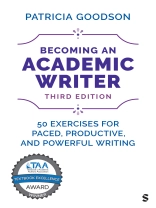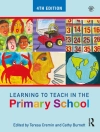With its friendly, step-by-step format, the
Third Edition of
Becoming an Academic Writer helps readers improve their writing by engaging in deep, deliberate, and daily practice. Author Patricia Goodson designed this book for anyone in an academic setting who must write to survive, from new graduate students to senior faculty. Featuring 50 exercises, this practical and flexible self-paced guide is organized so readers can either work through the exercises in order, or focus on the specific areas where they need additional practice. The
Third Edition features an expanded unit on how to manage the reading required for any writing project – a strategy to help writers avoid getting bogged down in this crucial step. Updated material, alongside testimonials from students and readers, new appendices on topics such as processing reviewer feedback, and new ‘Research Shows’ boxes help readers address important hurdles to developing a lower-stress, sustainable writing habit.
İçerik tablosu
Chapter 1. Get Ready to Practice
Part I. Practice Becoming a Productive Academic Writer
Chapter 2. Establish and Maintain the “Write” Habit
Chapter 3. Practice Building Academic Vocabulary
Chapter 4. Polish the Grammar
Chapter 5. Get Feedback
Chapter 6. Edit and Proofread
Part II. Practice Writing Introductions, Methods, Results/Findings, and Discussions
Chapter 7. Exercises for Writing Introductions & Purpose Statements
Chapter 8. Exercises for Writing the Methods Section
Chapter 9. Exercises for Writing the Results/Findings Section
Chapter 10. Exercises for Writing the Discussion or Conclusion Section
Chapter 11. Exercise for Writing Abstracts
Chapter 12. Reading-&-Writing: How to Stop Making the Literature Review an Excuse For Not Writing
Yazar hakkında
Patricia Goodson is professor of health education in the Department of Health & Kinesiology at Texas A&M University (TAMU). She obtained a bachelor’s degree in Linguistics (from Universidade Estadual de Campinas) and a master’s in Philosophy of Education (from Pontifícia Universidade Católica de Campinas) in Brazil; a master’s in General Theological Studies (from Covenant Theological Seminary) and a Ph D in Health Education (from the University of Texas at Austin) in the United States. At TAMU, she has taught mostly graduate-level courses such as Health Behavior Theory, Health Research Methods, Health Program Evaluation, Health Education Ethics, and Advanced Health Behavior Theory. In 2007, while acting as associate dean for Graduate Program Development, she created and implemented a college-wide writing support service for graduate students, based on the POWER model described in this book. Currently, as director of the College of Education and Human Development’s Writing Initiative (POWER Services), she offers Basic and Advanced Writing Studios for graduate students in the college, on a regular basis, and occasionally teaches writing workshops for faculty at Texas A&M and other universities. Dr. Goodson has won several department-, college-, and university- level awards for her teaching and research. In 2012 she was awarded the title of Presidential Professor for Teaching Excellence at Texas A&M University—one of the highest teaching awards at that university. Also in 2012, she became the university’s sole nominee for the Piper Professor Award, a state-level recognition for teaching. While she considers mentoring graduate students the most fulfilling part of her career, a couple of research interests vie for her attention. Her research focuses on topics such as sexual health of adults and adolescents, the history of the HIV/AIDS epidemic, and public health genomics. She has published extensively in high-impact journals, has reviewed for several prestigious publications, and has served as book review editor for The Journal of Sex Research. One of her intellectual passions is theory, and her “other” book presents a critique of health education’s current use of theory in both research and practice.












